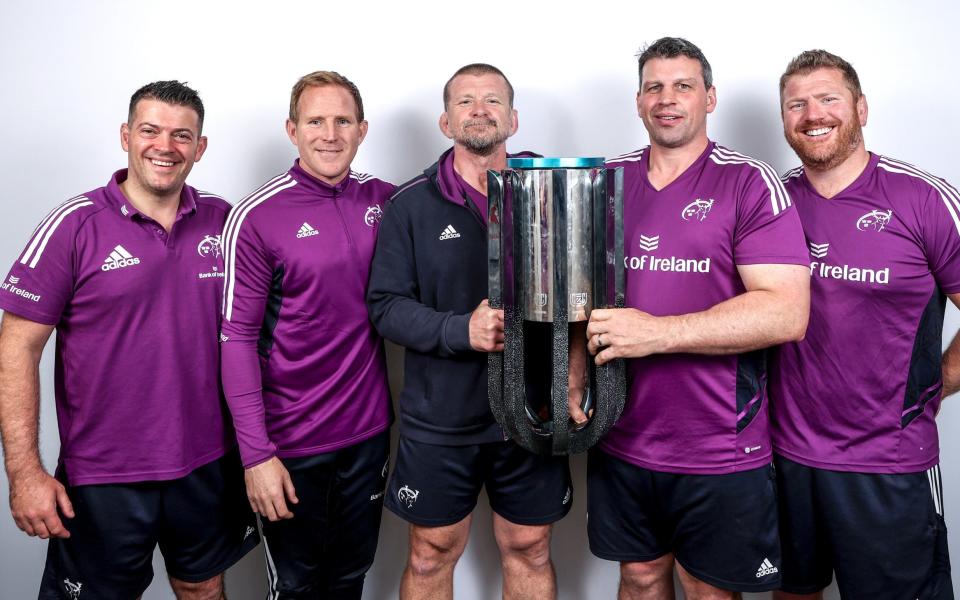English rugby’s short-sightedness exposed by Graham Rowntree and Munster

Munster's United Rugby Championship final victory on Saturday evening brought down the curtain on an extraordinary period of knockout rugby from the men in red. The Irish province travelled to Glasgow, Dublin, and then Cape Town – where the defending champions, Stormers, were conquered on Saturday – in the quarter-finals, semis and final respectively to claim the most unlikely of titles.
No-one had given Munster a chance. After losing five of their opening seven URC matches this season, Munster languished in 14th place in the league table and the critics were circling around Graham Rowntree in his first season as head coach. After Johann van Graan's sudden departure for Bath last season, the former Leicester, England and Lions prop was promoted to the top gig for the first time in his career. At the time, Rowntree's appointment was seen as a gamble – and, earlier this season, the nay-sayers were arguing that it had not paid off.
How wrong they were. Rowntree, alongside attack guru Mike Prendergast – a Limerick native who cut his coaching cloth at some of France’s snazziest clubs – has reinvigorated Munster, instilling a panache, ambition and belief that had been desperately lacking, but that came to the fore in Cape Town on Saturday.
It is worth remembering at this juncture how Rowntree ended up on the Irish west coast. The former loosehead was sacked by the Rugby Football Union – alongside head coach Stuart Lancaster and his assistants Andy Farrell and Mike Catt – after England’s disappointing 2015 World Cup campaign, where the hosts failed to progress from the pool stages for the first time in the tournament’s history.
Myopic RFU led to England talent drain
Despite an appreciation the writing was always going to be on the wall for that quartet after such a high-profile failure, the inescapable truth was that no-one in English rugby could possibly have been happy to see the back of them. These four Englishmen oversaw significant improvements with England after another World Cup debacle in 2011 and were coaches of esteem and integrity, respected by players and media alike.
Pressure is a cruel mistress and clearly it overwhelmed in 2015 but there was always an overriding sense of myopia in the RFU’s decision; a sense that the governing body was dismissing the quartet because it thought it had to rather than because it thought it was in the best interests of English rugby.
Sir Clive Woodward’s first World Cup in 1999 could not have been more at odds with his second in 2003, after all. Who knows what might have happened had the quartet survived their 2015 ignominy. Instead, the RFU opted for a certain Eddie Jones who, like that quartet, led England to some of their brightest days. Yet, England head into the 2023 World Cup with a head coach who will have only been in post 10 months by the time the tournament kicks off in September.
England rejects made Ireland world’s No 1 team
The RFU’s short-sightedness has now come back to bite them on the proverbial. Lancaster has proven himself as an inspirational, astute coach at Leinster and will head to Racing 92 next season with the keys to Dublin virtually in his pocket. Farrell and Catt have taken Ireland from World Cup underachievers to the world’s No 1 ranked team – with a Grand Slam and series win in New Zealand under their belts – and if they can banish Ireland’s global hoodoo in France later this year then they will have the keys to the entire country virtually in their pockets.
Before Saturday, however, that trio had already completed their respective journeys to redemption. They had banished their 2015 nightmare and rose from the ashes. The only one that remained was Rowntree. With Munster’s first major trophy since 2011, however, all four have now reached atonement. All four have proved their worth and Ireland are the beneficiaries. And, frighteningly, as is so often the case, English rugby is all the poorer for it.

 Yahoo Sport
Yahoo Sport 




































































